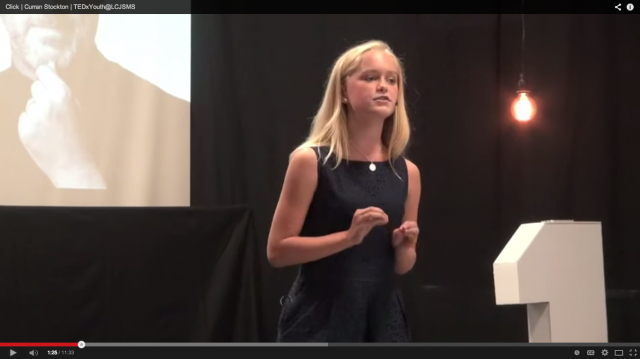
When Kate Griffith brought a huge batch of homemade chocolate chip cookies into an 8th grade class, she was doing more than sharing her culinary talents with hungry kids. An 8th grader herself, Griffith was conducting an experiment as part of the background research for her upcoming TEDx presentation. The test was simple: anyone willing and able to wait an hour would be rewarded with three cookies. “One by one, the kids left,” Griffith says, until finally only five of the original 20 kids remained to claim their prize. “My research told me that we didn’t have enough capacity to delay gratification, and we weren’t striving for it.”
Two years ago, Griffith was one of 10 students at the Lawton C. Johnson Summit Middle School, in New Jersey, to be selected for the school’s first TEDx program. Modelled on the popular TED talks, TEDx allows community organizations, towns and schools to put on their own version of a TED talk, featuring local experts, authorities or even teenagers, rather than nationally recognized figures.
More than 10,000 TEDx events have been held around the world since the program was launched in 2009, including those put on by schools like the one in Summit. To be recognized as an official TEDx event, organizers need to apply online for licensing and agree to TED’s detailed set of by-laws. What’s critical to the success of a youth-run TEDx program is the active participation of a teacher, says Salome Heusel, Deputy Director of TEDx.
At Summit, Randy Wallock provides that support. A 7th grade Language Arts teacher, Wallock had directed the school’s previous afterschool enrichment effort, known as the Scholar Laureate program, which involved writing lengthy research papers. “It had prestige to it, but the kids didn’t love it,” Wallock says. He wanted to replace it with something more dynamic and interesting, and stumbled on TEDx. “I thought it would be a good platform for enrichment,” he says. After applying for and receiving the TEDx license in the fall of 2012, he recruited teachers from special education, forensics and technology to make the program happen.
Wallock recruited students that first year. “I wanted to take the kids who might not be getting A’s, but who might need a challenge,” he says. He told them that the TEDx club was a pilot program, and that together they would figure out how to develop their ideas, manage their time, and learn how to present a speech. “Collaboration was one of the biggest things,” Wallock says, “and giving kids autonomy, working at their own pace, and choice.”

